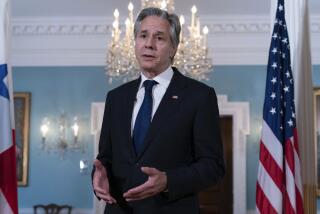How Hard to Push Gorbachev? : A Valiant Lithuania Looks to Go for Broke: How Wise?
- Share via
Early in the Lithuanian crisis, President Bush sensibly appealed to Soviet President Mikhail S. Gorbachev not to use force to keep the tiny Baltic nation in line and urged the leaders to talk over their problem. Then he tossed off one of his customary enigmatic lines: “There are certain realities in life,” he said. “The Lithuanians are well aware of them.”
The White House, which wisely has kept a low profile on Lithuania this week by trying to avoid making a bad situation worse, did not get into details about those realities. But as the days drag by and the Soviet military presence is increasingly intimidating and more blood is actually spilled, two realities are now painfully clear.
One is that Lithuania is free to ask whether it wants to stay on its present collision course. Another is that Gorbachev has no such freedom.
He walked the streets of Vilnius in January, collaring Lithuanians and trying to talk them out of seceding from the Soviet Union. Not only did he fail in that, but he failed to sense their desperation to be out from under the Kremlin’s thumb. He lost control so completely that after their Parliament declared itself no longer a part of the empire, Lithuanians began deserting the Soviet army, a point at which all armies usually draw the line. Under pressure from the army, political hard-liners and general concern in Moscow about chaos, Gorbachev began trying to achieve by a show of force what he failed to get by pressing the flesh in the streets of Vilnius.
Now he has a very serious problem. Solidarity leader Lech Walesa, symbol of Poland’s new-found freedom, joined other European leaders Tuesday in appealing to Gorbachev to pull back his troops and join Lithuanians in a search for a political solution. Bush has called for much the same thing. Fine, but moral support is the extent of what Lithuania can expect from the West. No nation will move to free Lithuania by force. What the United States ought not do is to create greater difficulty or to raise false hopes among the Lithuanians, who, in the end, are the ones who would be most hurt by bombastic and cruelly misleading American rhetoric.
It’s understandable that Lithuania feels that its freedom is an all-or-nothing, now-or-never proposition. But is it being realistic? North along the Baltic coastline, Estonia has weighed its own hopes of achieving the same goal as Lithuania and concluded that its best chance is to move slowly. The southern Soviet Republic of Georgia has put its own prospects for freedom from Moscow on hold. These may represent two more realities of life. And much the more pragmatic approach.
More to Read
Sign up for Essential California
The most important California stories and recommendations in your inbox every morning.
You may occasionally receive promotional content from the Los Angeles Times.













